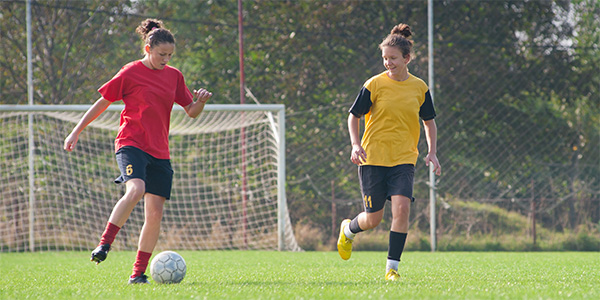Pediatric Comprehensive Concussion Clinic
Contact Us
(321) 842-9895Quick Scheduling with the Multidisciplinary Concussion Team
Enjoy comprehensive service and award-winning healthcare. Submit an appointment request today, and we will follow up with you to confirm a time that works for you and your family.

Concussions in Youth
We understand the concern that comes when a child is diagnosed with a concussion, whether from a traumatic injury or sports injury. We also understand the added stress that can be placed on a family trying to navigate follow-up care with the various specialists needed for proper evaluation and treatment.
At Orlando Health Arnold Palmer Hospital for Children, we want to be your most trusted source for comprehensive concussion care. We offer a multidisciplinary approach to concussion care — to recognize symptoms early on and ensure proper treatment for a full recovery. That’s why we have developed the Pediatric Comprehensive Concussion Clinic to provide complete care for pediatric patients from infancy to 21 years of age with a mild traumatic brain injury (mTBI) or concussion that requires close attention and follow-up shortly after diagnosis by a medical provider.
Your child will benefit from care by our trauma-trained pediatric providers. Our team will coordinate for complete care before safely integrating your child back into daily activities, school and/or sports.
What Is a Concussion?
A concussion is a type of traumatic brain injury caused by a hit or blow directly to the head or to the body, making the head jolt. This sudden impact, such as from a car accident, fall or sports injury, can cause the brain to move rapidly back and forth inside the skull. The resulting damage to the brain can affect a child’s physical abilities as well as their behavior, emotions, memory, sleep and more.
A child with a possible mild traumatic brain injury (mTBI), or concussion, needs to be seen by a healthcare provider who can make a proper diagnosis and determine when it is safe to reintegrate back into regular activities including school, sports and play. For a child who suffers a concussion, the health effects can be serious. While symptoms are usually most severe right after the injury, they sometimes may linger for months or longer.
Understanding the Symptoms
Concussion symptoms are not the same for everyone and may differ depending on the age of your child and the extent of the injury. While symptoms are usually most severe right after the injury, they may not show up right away — taking hours or even days to appear. After a major strike or blow to the head or body, check to see if your child is experiencing:
- Balance problems/dizziness or “seeing stars”
- Confusion or feeling “foggy”
- Double or fuzzy vision
- Fatigue
- Headache or a feeling of pressure in the head
- Irritability or crankiness
- Loss of balance or unsteady walking
- Memory problems
- Nausea or vomiting
- Ringing in the ears
- Sensitivity to light or sound
- Slurred speech
- Temporary loss of consciousness
If your child has experienced or is experiencing any of these symptoms, seek medical attention. If symptoms get worse, it’s best to be safe and take your child to the nearest emergency room.
Recovering Safely
Orlando Health Arnold Palmer is the only Level I Trauma Center for children in Central Florida and is recognized as a Verified Trauma Center by the Committee on Trauma. We have also has received Trauma Verification and Children’s Surgical Verification from the American College of Surgeons (ACS). This recognition demonstrates the expertise of our pediatric trauma providers to evaluate, diagnose and treat all types of concussions.
Our Pediatric Comprehensive Concussion Clinic specialists provide the clinical expertise, treatment and education your child needs to make a full recovery. Often, the best medicine for a concussion is time, with lots of rest and relaxation. Once the doctor gives permission for your child to return to regular activity, it’s important they take things slowly to avoid re-injury. As always, talk with your doctor about best practices for your child’s recovery.








